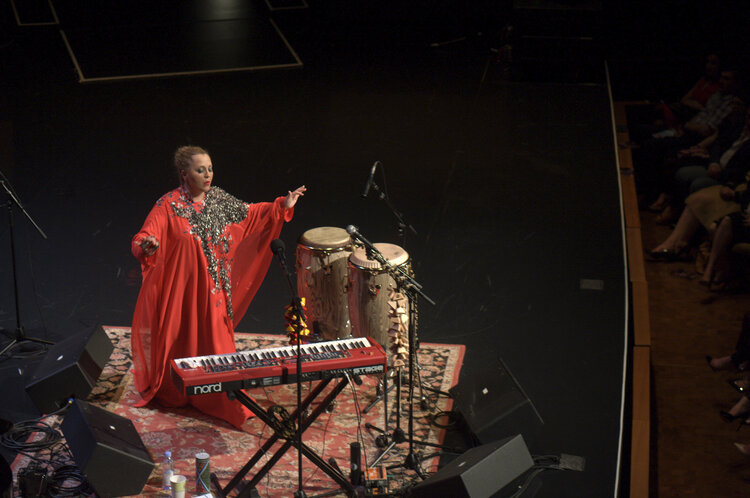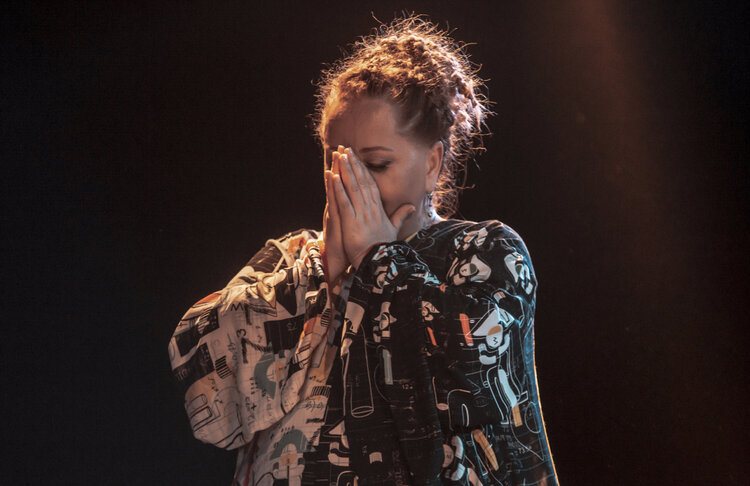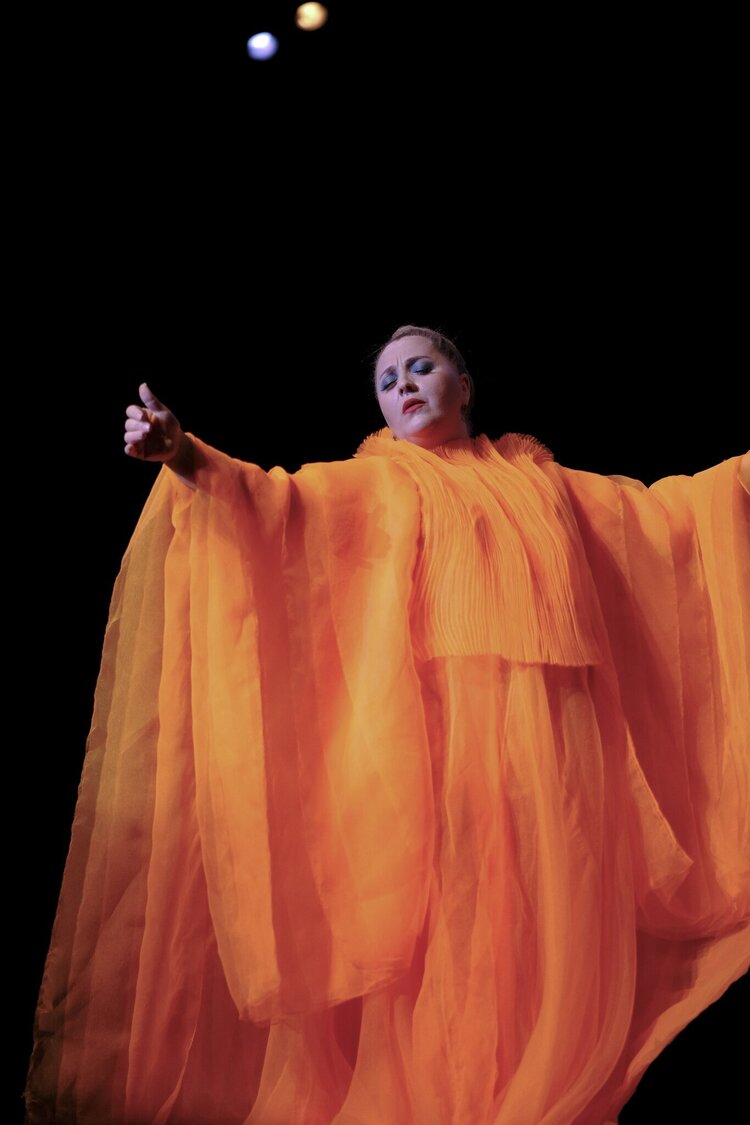Georgian singer Nino Katamadze: "Ukraine is my music, my conscience and my main character"
A conversation about faith in Ukraine, the role of politics in art and the patriotism of young people
On 28 and 29 April, Nino Katamadze, one of the most famous contemporary Georgian singers, who skilfully combines jazz, folk, and rock in her music, will give charity concerts at the Congress and Exhibition Centre Parkovy in Kyiv. Nino sings in Georgian. The only song she performs in a non-native language is the Ukrainian song "Chornobryvtsi".
The concert performance will include her favourite hits – "Olei", "Once In The Street", "Beauty", "Will Come As A Snow", and "Suliko" – and new songs that have not been performed before.
Nino Katamadze has been opposing the war in Ukraine since 2014. Established in Tbilisi since the beginning of the war, her charity foundation takes care of refugees from Ukraine. Last year alone, she performed four charity concerts in Kyiv, Lviv, and Rivne. And now she is travelling to Kyiv again to support Ukrainians.
On the eve of the concerts, Mind talked to Nino Katamadze about her strongest inspiration now, about the historical parallels between the events in Ukraine and Georgia and her confidence in our victory, about the challenges of the music industry and the narrative of 'art beyond politics'.
– Nino, you were among the first artists to clearly express their support for Ukraine during the full-scale invasion of russian troops. Some people continue to use the narrative of 'music is out of politics', 'art is out of politics'. What do you personally think about this?
– I believe that civilised people understand that society, creativity, politics, economics, science, all the space between us, all these activities brought together are interconnected. Politics affects all processes, and we cannot separate these interdependent things.

When you work and if you want to have economic freedom in this area, you don't want to be completely dependent on your politicians. So good politicians should do what? Anything to free me up so that I can be independent in my field. We have to show politicians what we want.
– Ukraine is now fighting for the right to its own cultural and ethnic identity in the world. The main goal is to get rid of russification, which Sakartvelo also suffers to this day. To what extent is it possible to get rid of this phenomenon?
– 300 years, since 1783, is how long the russification of our people has been going on, and we have the strength to resist. Everyone wants their neighbours to be good, everyone wants to live like that. But if your neighbours behave wrongly towards people, life and values that are important to us: the desire to develop, to be kind to each other, the desire for our grandparents not to die in poverty – but instead make sure they die from a neighbour's bomb – then we naturally want to distance ourselves.
So far, I have seen only propaganda from russia, and no good actions. I'm speaking without any political statements, as an ordinary person, as a citizen of my nation, who loves and chooses, who has survived the war. I think we have enough strength. We will resist as long as we can.
It is especially important that our young people, who were said to have no sense of citizenship and that cannot be patriots, turned out to be true patriots, the purest, the most correct. So when I look at young people, I say that we will succeed. And Ukraine will succeed.
– In what ways do you think the cultural struggles of Ukraine and Sakartvelo are similar?
– The fact that our paths are similar is obvious at first glance! If someone doesn't notice this, it's strange. One example is in front of you: I am in this struggle. And as long as I am here, we are on the battlefield against injustice.
– You were a member of the jury in the Ukrainian version of The X Factor in the fifth and sixth seasons.
– Yes, it was the best time. I want it to come back so badly so that I can go back to a calm, peaceful city and do nothing but listen to music.
– How do you think Ukrainian music has changed since then?
– The main theme has changed. Now it's about patriotism. All the Ukrainian musicians I've spoken to at least once are thinking about their country. Thank God, I don't know a single person who doesn't share our common opinion about peace and freedom in Ukraine.
– Are there any Ukrainian artists on your playlist?
– There are! Firstly, I personally know many Ukrainian musicians. I listen to Katya Chilly, I have songs by Vakarchuk and Dorn in my playlist. When I listen to this music, I'm not listening as a musician, but as a friend. I can feel their hearts hurting, and I want to support them. I am not the same listener of Ukrainian music as I used to be. In fact, I listen to music in a completely different way now.
– What about Georgian contemporary music, which artists are on your playlist?
– I will be accompanied by the beautiful Natalia Nakopia in Kyiv. You should listen to her. Her style is completely different from mine. She is very interesting and talented. She graduated from Berklee.
Natalia wanted to come with us, she agreed on her own. And fortunately, the Ukrainian audience will have the opportunity to listen to her.
There are many talented young people. Giorgi Gigashvili won the second prize at an important festival. He is a classic, but he always experiments. He and his friends create modern and extremely beautiful music. Nini Nutsebidze was on the Ukrainian X-Factor. Giorgi was there with her. Nini is a wonderful singer.
I see that young people in Georgia perceive music in a completely different way. It's such a happiness to hear music from a completely different world around you, relevant music. You can feel all the world's musical vibrations in the wonderful little Georgia. I understand how huge its musical potential is.
Listen to Kayakata, Bedford falls. There are many great artists in Georgia. My favourite is Nikoloz Rachveli, a conductor and composer. He has supported Ukraine from day one!
– In your opinion, how much have listeners and music lovers changed in the world today and what have they become?
– If music has changed, then the listener has changed. Everything that changes is changing for the better. If we want to influence, to help some good thing, we need to act carefully, to be careful not to kill, but to help.
In general, if we want to change something around us, we need to get involved and change it! Because nothing will get better by itself.
– What is being actively promoted in the global music industry now is rap culture, a new generation of pop music. What do you admire about it and what, perhaps, scares you?
– You know, you can't always look for something you don't like, it's a wrong approach. You can use the "like/dislike" principle when you are going to buy tickets and go to a concert.
However, it is important to remember that if a culture exists, it is a phenomenon of our life, of what is around us. You need to listen carefully, even to those you don't like. Because creativity, music, and all art movements are the voices of inner freedom. That's why I like everything that exists, in any form.
'Like' is not the right word. I'm interested in studying the places I find myself in, why they sound the way they do, and why they say the words they say. It's interesting to see what's trending now, what's in fashion. It's important to be where a new voice is heard all the time. It's like a new wind, like air.

You might not like something, but then you risk being lonely.
– What about contemporary jazz? How do you see it, and how much has it changed over the last 10 years?
– It's hard to say. Everything alive is bound to change. People have changed. 20 years ago, life was completely different, without the Internet. People lived at a different speed. If 20 years ago 10% of the world's culture was available, now all 100% is available to those who want it.
– To what extent does commerce prevail in contemporary music? Isn't music becoming an instrument of commerce only? After all, there are lots of people who want to play music even without any talent, and they, unlike talented people, sometimes succeed even more often.
– Of course, the music business is also changing. However, first of all, I myself live in Georgia. If I lived in America, I would tell you about my experience and business. But the music business in Georgia is not a business. Georgian artists depend on government support. They sing wherever they are given the opportunity to perform. For example, on City Day or New Year's Eve. They are funded through taxes paid by ordinary people. Unfortunately, the musicians don't even think that it is not some money 'from outer space'.
I hope that when the war in Ukraine is over, you will have some other system that is not based on the state Ministry of Culture. These are the remnants and consequences of the terrible Soviet system. With this system, artists will always be dependent on government funding and will always say that art is beyond politics. It is not at all. Especially in the current situation.

We're not even talking about business. In the civilised world, there is a system for an artist to be independent and not have to smile at the Minister of Culture one more time to get the opportunity to sing at a concert. When artists are free, they create a completely different kind of art.
– What are your three favourite music albums that have influenced you as a musician?
– I want to answer this question like this. I am not influenced by music. I am influenced by people who behave heroically. Now my main inspiration is my beloved Ukraine. It is my music, my conscience and my main character.
– On 28 and 29 April, you will give two concerts in Kyiv, part of the proceeds from which will go to support the Armed Forces of Ukraine. What can visitors expect?
– For me, it's an opportunity to meet my Ukraine and people, to sing for each other and to show once again that we are close. Close when it is important to be together.